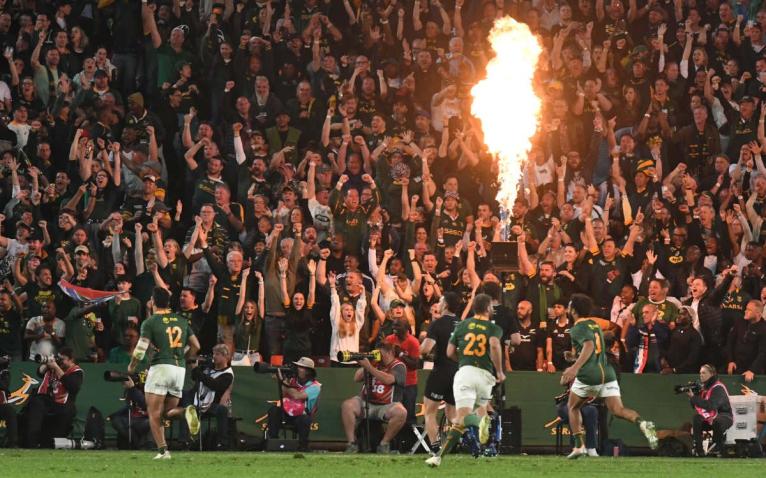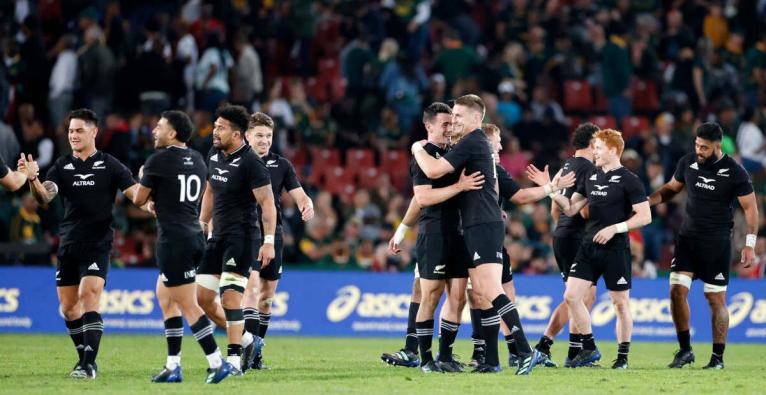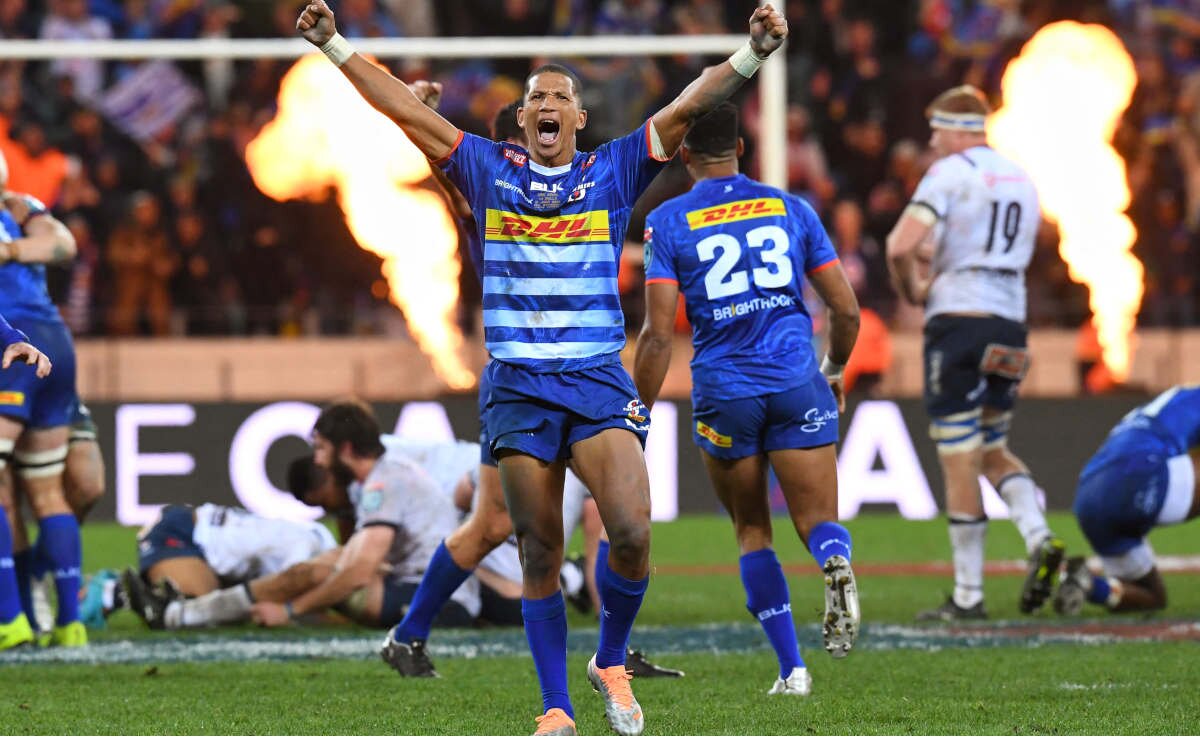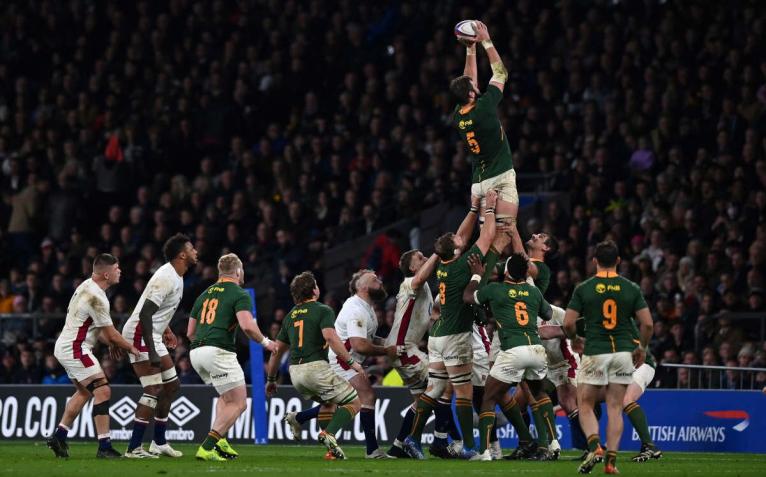A sea of green and gold parts grudgingly as the All Blacks team bus enters the Ellis Park precinct in downtown Johannesburg. Chants of “Ole, ole, ole!” drown out the sirens of the police escort, before the crowd launches into an aggressive rendition of “Hie’ Kommie Bokke!” – another familiar South African rugby anthem.
The bus pulls up as close as possible to the VIP entrance to allow for a quick deposit of the players and management staff. The players seated on the far side of the bus look down on the hostile scene below with wide eyes.
“Never seen anything like it,” a New Zealand colleague attending his first Test at Ellis Park tells me. “You’d never get anything like this back home when the opposition arrives at the ground. New Zealand people are chilled.”
Ellis Park, of course, has zero chill.

For the first time post-Covid, Test rugby is back and the storied ground is filled to capacity. What’s more, the next chapter of one of rugby’s fiercest rivalries is about to unfold.
The anthem singers are drowned out by 62,000 zealots screaming at the top of the lungs. The haka is rendered inaudible by a partisan crowd that has taken it upon themselves to respond on the Springboks’ behalf.
Hell on earth for visiting teams? Pretty much. But in the midst of this chaos, there is a team that hasn’t abandoned all hope just yet.
The All Blacks wait patiently as a Boeing 747 flies dangerously low over the stadium with the message “Go Bokke” scrawled across its underbelly. They stand in silence as the stadium rocks with the collective cries of Nkosi Sikelel’ iAfrika – a rousing and inspiring performance that feels like a celebration of Test rugby’s return to one of its most famous battlefields.
The vitriol flowed on social media, as Bok fans took aim at coach Jacques Nienaber’s selections, as well as referee Luke Pearce’s decisions against the home team.
Feeding off the energy, the All Blacks power into a 15-0 lead. The crowd falls silent, before a late first-half try by Lukhanyo Am brings it back to life. The Boks claw their way back into the contest, and appear to be on course for a comeback victory after Handré Pollard steers them into the lead in the 67th minute.
It’s the All Blacks, however, who shrug off the effects of altitude in the closing stages and finish with a flourish. Ian Foster’s side wins 35-23 and retains the Freedom Cup. The All Blacks – written off by all and sundry only a day earlier – have strengthened their position as the dominant half of the rivalry.
The result at Ellis Park prompted a variety of reactions.
Disappointed South Africans filed out of the ground after the final try was scored, not waiting to see whether Richie Mo’unga would slot the conversion or not. The vitriol flowed on social media, as Bok fans took aim at coach Jacques Nienaber’s selections, as well as referee Luke Pearce’s decisions against the home team.

Some New Zealanders felt that the All Blacks had proved a point in the harshest of environments. Others wondered whether the result might delay a necessary change to the national coaching staff and structures.
Few acknowledged the collective statement made by the two teams across an epic fortnight of Test rugby.
The decision to tweak the Rugby Championship format to allow for two-match tours in a single country was a step in the right direction. As a result, the Freedom Cup was played over a two-week period, and the South Africa-New Zealand rivalry was given all the attention it deserves.
If there is one thing that the fans of the respective nations can agree on, it’s that this annual mini-series must survive any significant changes to the rugby calendar – which may be implemented as soon as 2025, when the present broadcasting deal expires.
When the Covid-19 pandemic brought the game to a halt in 2020, NZRU ditched SA Rugby and pushed forward with its plans to stage a new Super Rugby tournament featuring teams from New Zealand, Australia and the Pacific islands
The future of the Sanzaar alliance – and ultimately the marquee matchup between the Boks and All Blacks – has been in doubt for some time. The developments of the past 12 months has fuelled speculation that SA Rugby will complete its migration to the northern hemisphere. It may not be long before the Boks as well as the South African franchises are competing in European tournaments.
When the Covid-19 pandemic brought the game to a halt in 2020, the New Zealand Rugby Union ditched SA Rugby and pushed forward with its plans to stage a new Super Rugby tournament featuring teams from New Zealand, Australia and the Pacific islands.
This provided SA Rugby with the opportunity to pursue a long-anticipated move to Europe. The Cheetahs and Southern Kings were withdrawn from the Pro14 in order to accommodate the Bulls, Lions, Sharks and Stormers in a revamped 16-side competition called the United Rugby Championship.

South African rugby’s first season in the northern hemisphere was a roaring success. After a shaky start, the franchises adapted to the style of play as well as the conditions. Three of the four franchises progressed to the playoffs.
The Bulls scored the upset of the season when they beat Irish giants Leinster in the semi-final staged in Dublin. Two South African teams – the Stormers and Bulls – contested the inaugural URC final in front of a big crowd at Cape Town stadium.
By then, the Bulls, Sharks and Stormers had already qualified for the 2022/23 Champions Cup. It later emerged that the Lions and a fifth South African team – the Cheetahs – had secured a place in the Challenge Cup.
The South African franchises have more than a foothold in Europe. They are here to stay. It now remains to be seen whether the Boks will form part of the Six Nations – or an expanded Seven Nations tournament – in future.
SA Rugby may need to make a difficult choice. As it stands, South African rugby is straddling two hemispheres, with its franchise players competing across the European season and the Boks continuing to play in the Rugby Championship
At some point, SA Rugby may need to make a difficult choice, though.
As it stands, South African rugby is straddling two hemispheres, with its franchise players competing across the European season and the Boks continuing to play in the Rugby Championship alongside the other Sanzaar nations.
The latter tournament currently runs from early August to late September. Ultimately the Boks are being asked to play some of their toughest Test matches at a time when many European club players are enjoying a well-deserved break.
It’s plain to see why this situation is unsustainable. While protocols are in place to ensure that top South African players are rested and that they aren’t overplayed, the lack of a designated off-season is a problem that needs to be addressed sooner rather than later.
If the Boks were accepted into the Six Nations family, then the South African national team as well as the franchises, would follow the northern hemisphere schedule to the letter. That would mitigate some of the conflict between club and country, and ensure that all local South African players are granted a proper off-season and pre-season.

Of course, that would beg the question of the annual mini-series between the Boks and All Blacks. Would there be space for those two games in a more streamlined rugby calendar? Or would the powers that be schedule tours or even one-off fixtures on a less regular basis?
England, for example, tour South Africa once every five or six years. It would be a shame if the Boks and All Blacks competed in a series every second or third year, and if sojourns to South African and New Zealand were less frequent than British & Irish Lions tours.
Another option that’s been tabled is the staging of the Rugby Championship and the Six Nations in the same international window – sometime between March and April. This would ensure greater alignment between the hemispheres in a truly global season.
A rugby landscape bereft on a regular Boks-All Blacks showdown would be bleak. It’s hard to understand why anyone – be they a fan or administrator – would want less of these battles.
The Boks won’t be able to compete in both tournaments, though, and many will ask whether a place in the Six Nations is worth more than an annual battle with the All Blacks.
It would be akin to stripping the rugby calendar of the Calcutta Cup or cancelling Le Crunch. These clashes tend to deliver their own brand of rugby and energy, and the game would be poorer if they were staged less frequently.
A rugby landscape bereft on a regular Boks-All Blacks showdown would be equally bleak. The unique rivalry lived up to the hype in Mbombela and Johannesburg recently, and it’s hard to understand why anyone – be they a fan or administrator – would want less of these battles.



Playing 6 (7) Nations will be like playing a World Cup every year. Not sure how this will impact on international rugby. It may for instance take the interest out of the WC …..
What ever the outcome, the old boys in bad blue blazers will make the wrong decision!
If we want to grow the game, we need to think beyond the existing teams. Australia's union team is struggling, in part because it is regularly getting beaten by SA/NZ. This cosy love-in for the status quo is exactly what holds the game back.
Absolutely love the Boks to stay.
Please stop saying we kicked them out of super rugby. Australia did plus add covid.
Lets bring back tours! Proper tours. 3 match minimum.
Unfortunately I don't think it makes much sense for SA to be in the Championship. The travel and time zones differences are more than enough in themselves to justify joining the 6 nations. I would love to see the ABs and Springboks play alternate home/away 3 match series every other year, similar to the Ashes in cricket.